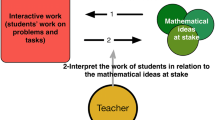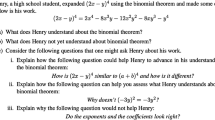Abstract
In this article we offer a theoretical discussion of teachers' mathematics-for-teaching, using complexity science as a framework for interpretation. We illustrate the discussion with some teachers' interactions around mathematics that arose in the context of an in-service session. We use the events from that session to illustrate four intertwining aspects of teachers' mathematics-for-teaching. We label these aspects “mathematical objects,” “curriculum structures,” “classroom collectivity,” and “subjective understanding”. Drawing on complexity science, we argue that these phenomena are nested in one another and that they obey similar dynamics, albeit on very different time scales. We conjecture (1) that a particular fluency with these four aspects is important for mathematics teaching and (2) that these aspects might serve as appropriate emphases for courses in mathematics intended for teachers.
Similar content being viewed by others
References
American Psychological Association: 2001, Publication Manual of the American Psychological Association, 5th ed., Author, Washington, DC.
Ball, D.L. and Bass, H.: 2003, ‘Toward a practice-based theory of mathematical knowledge for teaching’, in E. Simmt and B. Davis (eds.), Proceedings of the 2002 Annual Meeting of the Canadian Mathematics Education Study Group/Groupe Canadien d’Étude en Didactique des Mathématiques, CMESG/GCEDM, Edmonton, AB, pp. 3–14.
Ball, D.L., Lubienski, S. and Mewborn, D.: 2001, ‘Research on teaching mathematics: The unsolved problem of teachers’ mathematical knowledge’, in V. Richardson (ed.), Handbook of Research on Teaching, 4th ed., Macmillan, New York, pp. 433– 456.
Bass, H.: 2004, Mathematicians, Mathematics, and Mathematics Education, Keynote address at the 10th International Congress of Mathematics Educators, Copenhagen, Denmark, July 5.
Bauersfeld, H.: 1988, ‘Interaction, construction and knowledge – alternative perspectives for mathematics education’, in D. Grouws and T. Cooney (eds.), Perspectives on Research on Effective Mathematics Teaching: Research Agenda for Mathematics Education, Vol. 1, National Council of Teachers of Mathematics and Lawrence Erlbaum Associates, Reston, VA, pp. 27–46.
Begle, E.G.: 1979, Critical Variables in Mathematics Education: Findings from a Survey of the Empirical Literature, Mathematical Association of America and National Council of Teachers of Mathematics, Washington, DC.
Conference Board of Mathematical Sciences: 2001, The Mathematical Education of Teachers, Mathematical Association of America, Washington, DC.
Cooney, T. and Wiegel, H.: 2003, ‘Examining the mathematics in mathematics teacher education’, in A. Bishop, M. Clemens, C. Keitel, J. Kilpatrick, and F. Leung (eds.), Second International Handbook of Mathematics Education, Vol. 2, Kluwer, Dordrecht, pp. 795–828.
Davis, B. and Simmt, E.: 2003, ‘Understanding learning systems: Mathematics education and complexity science,’ Journal for Research in Mathematics Education 34(2), 137–167.
Davis, B., Sumara, D. and Luce-Kapler, R.: 2000, Engaging Minds: Learning and Teaching in a Complex World, Lawrence Erlbaum Associates, Mahwah, NJ.
Dehaene, S.: 1997, The Number Sense: How the Mind Creates Mathematics, Oxford University Press, New York.
Freudenthal, H.: 1973, Mathematics as an Educational Task, D. Reidel, Dordrecht.
Johnson, S.: 2001, Emergence: The Connected Lives of Ants, Brains, Cities, and Software, Scribner, New York.
Kelly, K.: 1994, Out of Control: The New Biology of Machines, Social Systems, and the Economic World, Perseus, Cambridge, MA.
Lakoff, G. and Núñez, R.: 2000, Where Mathematics Comes From: How the Embodied Mind Brings Mathematics into Being, Basic Books, New York.
Mazur, B.: 2003, Imagining Numbers (Particularly the Square Root of Minus Fifteen), Farrar Straus Giroux, New York.
Monk, D.H.: 1994, ‘Subject area preparation of secondary mathematics and science teachers and student achievement’, Economics of Education Review 13(2), 125–145.
Norretranders, T.: 1998, in: J. Sydenham (trans.), The User Illusion: Cutting Consciousness Down to Size, Viking, New York.
Radford, L.: 2002, ‘The seen, the spoken and the written: A semiotic approach to the problem of objectification of mathematics knowledge’, For the Learning of Mathematics 22(2), 14–23.
Rotman, B.: 2000, Mathematics as Sign: Writing, Imagining, Counting, Stanford University Press, Stanford, CA.
Seife, C.: 2000, Zero: The Biography of a Dangerous Number, Viking Penguin, New York.
Steffe, L.P. and Kieren, T.E.: 1994, ‘Radical constructivism and mathematics education’, Journal for Research in Mathematics Education 25, 711–733.
Varela, F.: 1999, Ethical Know-How: Action, Wisdom, and Cognition. Stanford University Press, Stanford, CA.
Watson, A. and Mason, J.: 2002, ‘Extending example spaces as a learning/teaching strategy in mathematics’, in A. Cockburn and E. Nardi (eds.), Proceedings of the 26th Annual Meeting of the Psychology of Mathematics Education Group, University of East Anglia, UK, pp. 377–385.
Author information
Authors and Affiliations
Rights and permissions
About this article
Cite this article
Davis, B., Simmt, E. Mathematics-for-Teaching: an Ongoing Investigation of the Mathematics that Teachers (Need to) Know. Educ Stud Math 61, 293–319 (2006). https://doi.org/10.1007/s10649-006-2372-4
Issue Date:
DOI: https://doi.org/10.1007/s10649-006-2372-4




